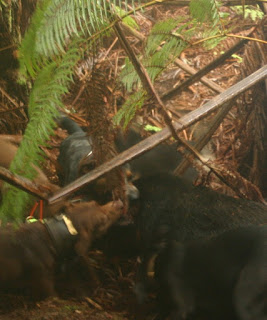.jpg)
I was with a 91-year old man, who has lived in Ka'u his whole life. He still farms coffee on his homestead surrounded by macadamia orchards. He astounded everyone when he ran off to get us a jabong to try. Someone asked him, "What do you eat everyday, that you are so fit at your age?" He said, "I drink five, six cups of coffee every day. I have toast for breakfast and fruit. I eat bento for lunch. I used to go up in the mountains every weekend hunt pig. I would still go but I too deaf already. No can hear the dog bark. I used to make kalua pig, lau-lau, smoke meat, sausage. Those pigs, they only eat natural stuffs, no chemicals! All the food you buy these days, all full of chemicals. No good."
His son was gored by a pig just this last year.
Wild pig meat is an interesting substance to work with as a cook. It tastes like forests, is resilient to the tooth, and it's impossible to get it to brown. It just goes from raw to rubbery. In other words you can't just fry up some pork chops. Oh no! You have to be clever and resourceful. You have to overcome the pig yet another time, as it were, in order to get something good to eat.
The most popular strategy is to cut the wild pork into thin strips, soak the strips in a strong marinade, and then smoke them in your handy smoke-house, constructed just to deal with the problem of having wild pig meat to eat. Fried up, wild pig smoke meat is dense with flavors - redolent of ginger, soy sauce, sugar, garlic with just a hint of wild fern shoot in the background. It is the star of any pupu table, the visible proof of a man's he-man-ness, and the gift of the forest to this all-too-civilized world.
Glossary
His son was gored by a pig just this last year.
Wild pig meat is an interesting substance to work with as a cook. It tastes like forests, is resilient to the tooth, and it's impossible to get it to brown. It just goes from raw to rubbery. In other words you can't just fry up some pork chops. Oh no! You have to be clever and resourceful. You have to overcome the pig yet another time, as it were, in order to get something good to eat.
The most popular strategy is to cut the wild pork into thin strips, soak the strips in a strong marinade, and then smoke them in your handy smoke-house, constructed just to deal with the problem of having wild pig meat to eat. Fried up, wild pig smoke meat is dense with flavors - redolent of ginger, soy sauce, sugar, garlic with just a hint of wild fern shoot in the background. It is the star of any pupu table, the visible proof of a man's he-man-ness, and the gift of the forest to this all-too-civilized world.
Glossary
jabong - pomelo (Filipino)
bento - packed lunch, for eating in the field (Japanese)
kalua - pit oven-cooked (Hawaiian)
lau-lau - literally "leaf-leaf", seasoned meats & fish wrapped in two kinds of leaves & kalua-d (Hawaiian)
pupu - tapas (Hawaiian)